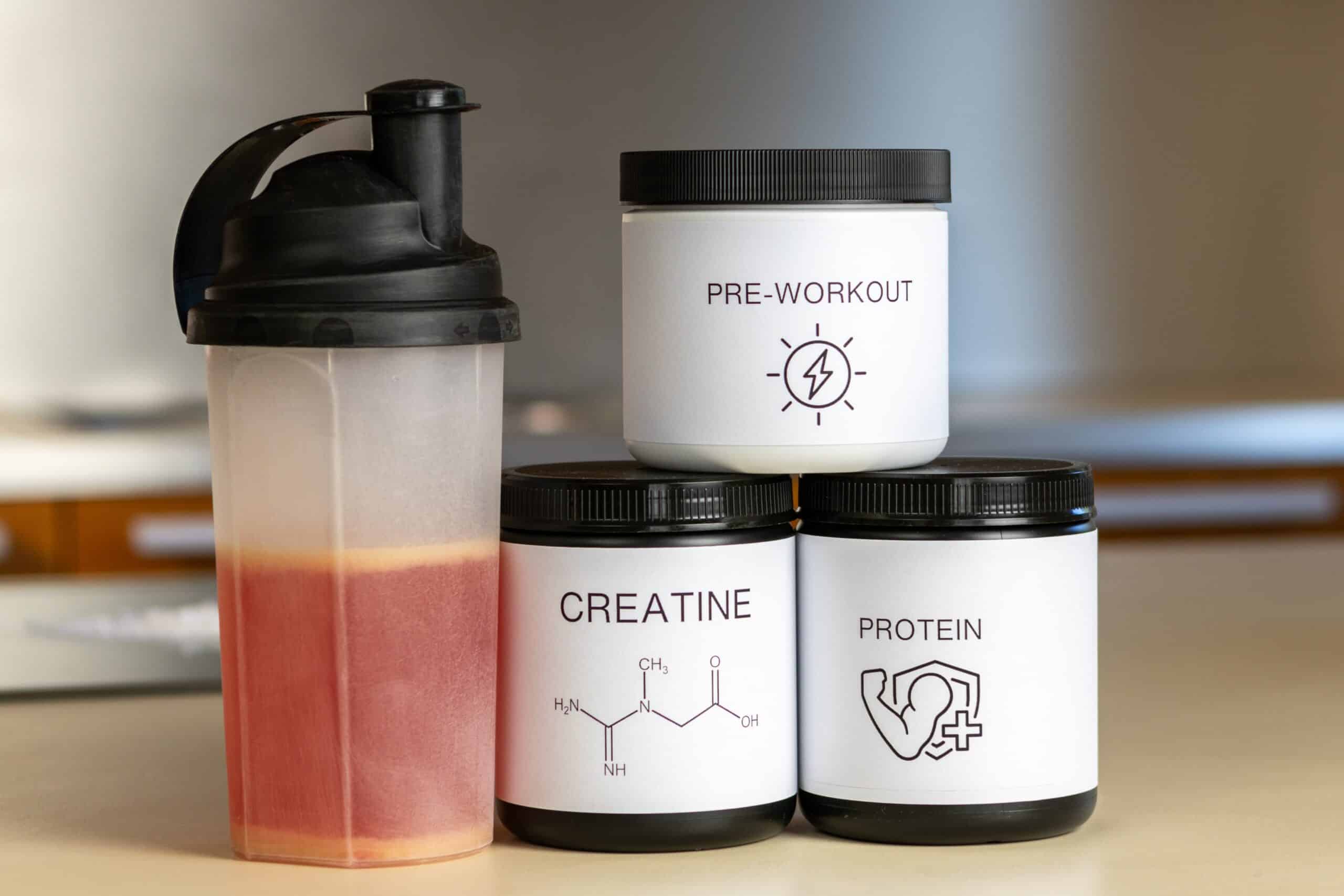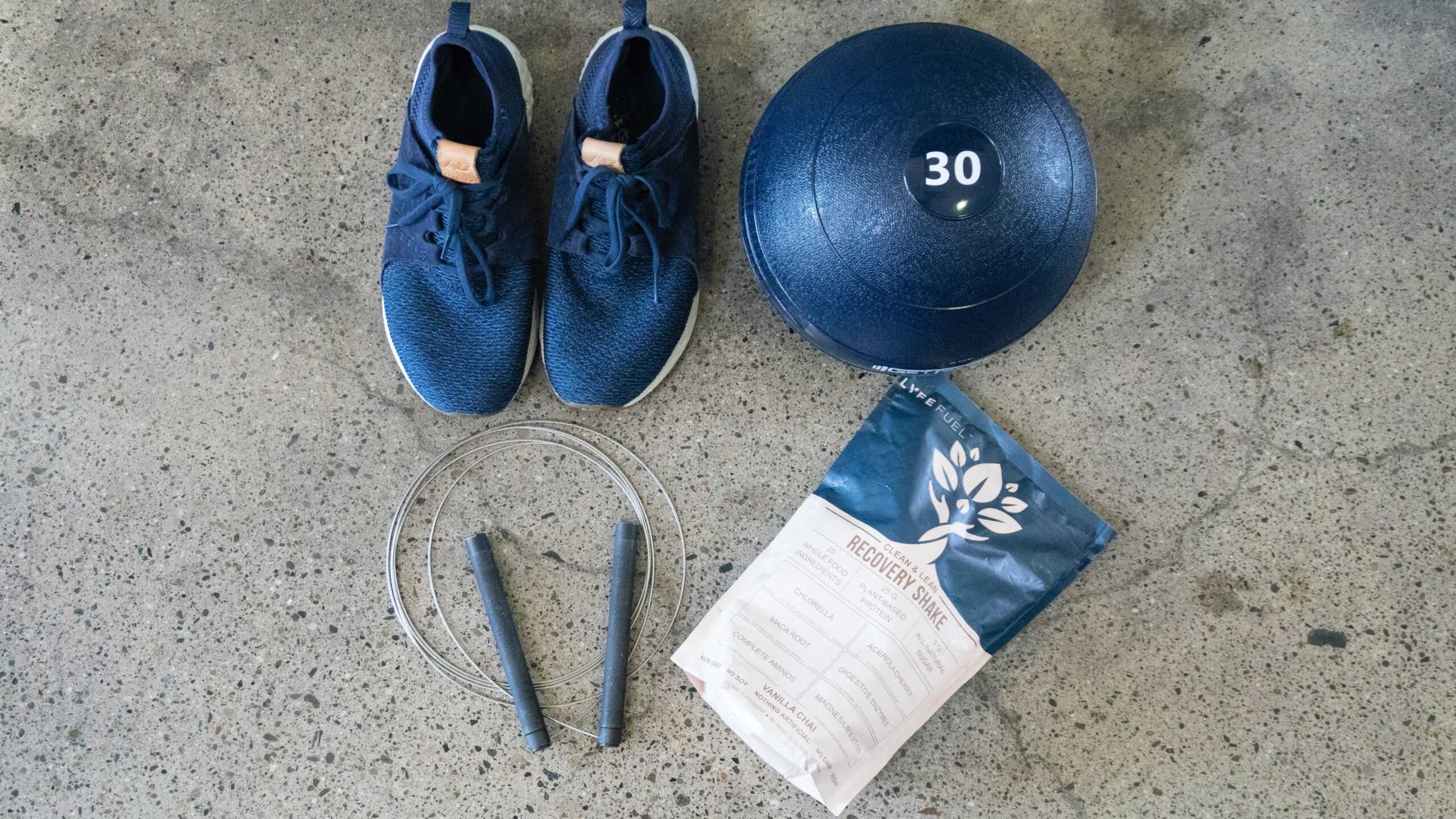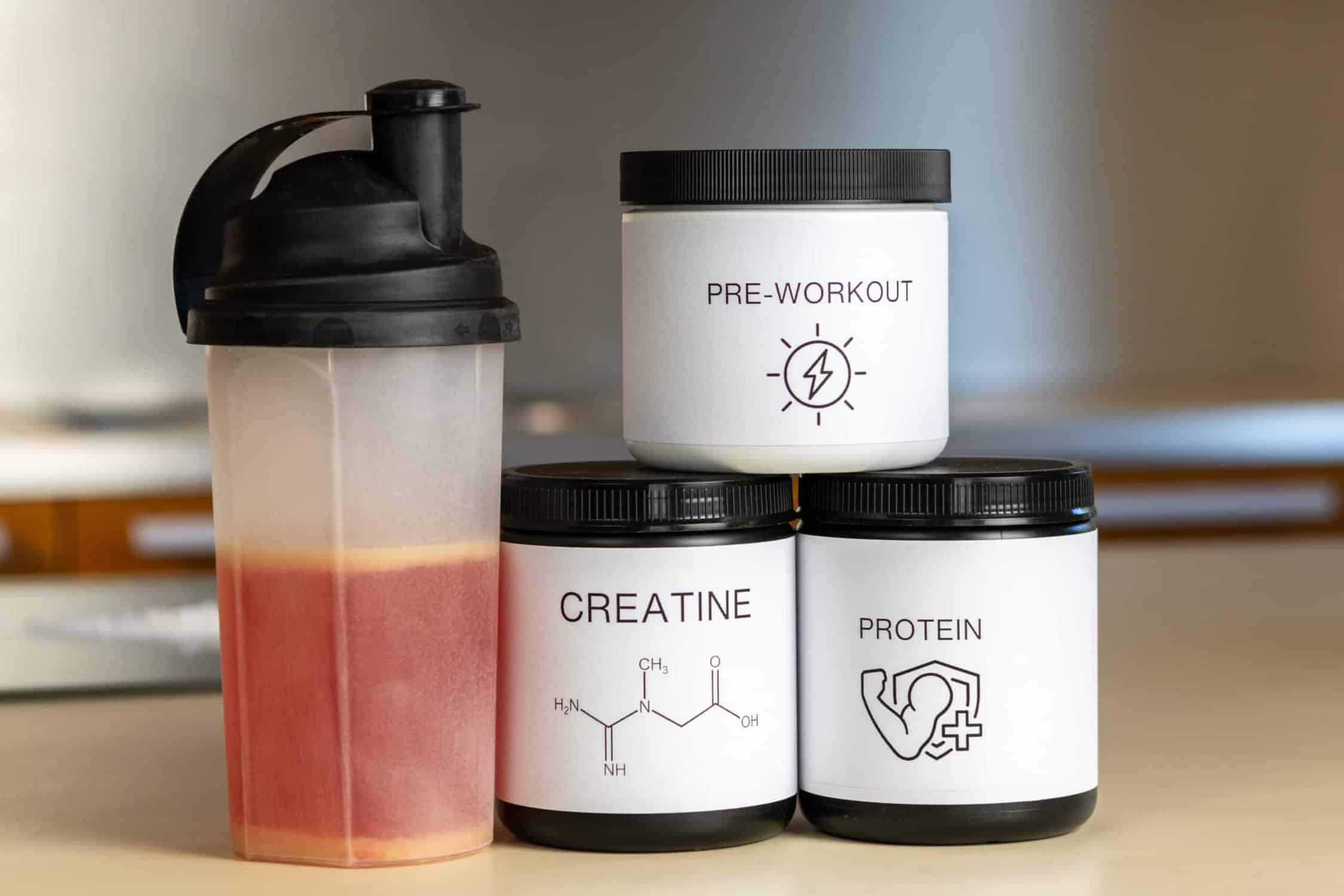Creatine is becoming more mainstream. It’s becoming less of a secret that creatine is a very effective ergogenic supplement available to all athletes. Creatine has been reported to increase high-intensity exercise capacity and lean body mass during training. In fact, governing bodies like the International Society of Sports Nutrition have endorsed its use as a strategy for improving athletic performance. But, what about creatine for runners?
If you’re like me, you may associate creatine with the sports it’s most popular in: bodybuilding and weightlifting.
Do runners have any business taking creatine? What does creatine do for runners?
Is there scientific evidence that creatine can benefit endurance athletes, marathon runners, or ultra runners? Is creatine something that you should consider taking for running performance?
As a registered dietitian, I’m usually wary of the supplement industry. It’s well understood that the sports supplement industry is rife with marketing, unsupported claims, and false promises for exercise performance.
In this article, we’ll take a look at the scientific research and data to you navigate the hype around how creatine might impact endurance performance including:
- What is Creatine
- What Creatine is Most Commonly Used For
- What Does Creatine Do For Runners
- Is Creatine Supplementation Safe?
- The Side Effects of Creatine for Runners
- The Benefits of Creatine for Long Distance Runners
- How Much Creatine Should You Take?
- Frequently Asked Questions About Creatine For Runners

What is Creatine?
Creatine is a naturally occurring compound that plays a key role in energy production systems of the body.
It’s made up of three amino acids: arginine, glycine, and methionine.
Creatine is stored in skeletal muscles and is used as a quick source of energy during high-intensity, short-duration activities, such as weightlifting, sprinting, and jumping.
The body can produce creatine on its own from arginine, glycine, and methionine in the liver, pancreas, and spleen. Creatine is also obtained from foods like red meat and fish.
However, many athletes seeking muscular strength gains choose to take creatine supplements to increase their creatine stores.
Creatine supplements are all the rave among athletes and bodybuilders, and for good reason. Creatine has been shown to enhance performance during short, high-intensity activities, such as lifting, sprinting, interval training, etc. Potential benefits of creatine supplementation include improved strength, power, and muscle mass.
The Phosphagen System and ATP
Our body has several biochemical mechanisms for turning food into useable energy.
The quickest and most immediate energy pathway for our cells is called the phosphagen system (AKA the ATP-Pcr system).
It uses creatine phosphate to generate adenosine triphosphate (ATP) for muscle contraction.
This anaerobic system is responsible for creating energy at the onset of all physical activity. It is also responsible for providing energy for high-intensity, short duration activity (such as a sprint, a clean and jerk, or a shot put throw).
As a general rule, the phosphagen system will only provide enough energy to sustain upwards of 10 seconds of maximal effort activity.
Our bodies don’t store much ATP because it is quickly used up in other energy systems to keep our heart pumping, brain working, and more.
This is where creatine comes in.
By taking creatine, you can build up phosphocreatine stores in your muscles and have access to instant energy.

What does creatine do for runners?
So, creatine is clearly useful for high intensity bursts. But what about for aerobic sport?
Long-distance running does not use the ATP-PCr system. Rather, running relies on glycolysis and oxidative metabolism.
The main benefit for runners of supplementing with creatine comes in enhancing muscle running recovery, not so much performance (unless you’re a sprinter, because of its contribution to explosive actions).
If you are in a high volume training load, such as in the peak phase of marathon training, you may get benefit from supplementing with creatine after your workouts. It may help promote muscle recovery and glycogen synthesis.
The logic here is that if you’re able to recover faster, you can train harder. And, as a result, your performance might improve.
Runners who might benefit from creatine
Other runners that might benefit from creatine supplementation include:
- Runners over the age of 50. Research has shown that creatine supplementation has the potential to increase aging muscle mass, muscle performance, and decrease the risk of falls and possibly attenuate inflammation and loss of bone mineral.
- Runners who strength train more than twice per week. Strength training for runners can lead to muscle damage and soreness. Which, may affect a your ability to maintain training volume and intensity. Creatine aids in muscle recovery by reducing inflammation and oxidative stress, potentially helping you recover faster between strength training sessions.
- Sprinters. Creatine supplementation enhances muscle strength and power. This can be beneficial for sprinters during quick bursts, hill runs, or finishing kicks in races. Increased strength and power can help you generate more force with each stride, potentially leading to better race performance and faster times.
- Long distance runners in a peak volume training cycle. As mentioned above, if you are in the peak phase of marathon training, you may get benefit from supplementing with creatine after your workouts to promote muscle recovery and glycogen synthesis. This may not be something you take every day, but supplement during peak weak of training or after long runs.
- Runners that are carb-loading. Creatine increases the uptake of glucose into muscle cells, leading to even greater storage of glycogen, which serves as a primary source of energy during endurance events like running.
- Injured runners. Creatine supplementation, in combination with proper rehab exercises and physiotherapy, can help preserve muscle mass during periods of inactivity. This can be especially important for a faster return to running and overall athletic performance.
Is creatine supplementation safe?
According to the International Society of Sports Nutrition, there is no scientific evidence that the short- or long-term use of creatine monohydrate (up to 30 g/day for 5 years) has any detrimental effects on otherwise healthy individuals.
Simply, yes. Creatine is one of the safer supplements for runners you could take.
Possible side effects of creatine supplements
The most well documented side effect of creatine is water retention leading to mild transient weight gain.
There have been anecdotal claims on social media of side effects including de-hydration, muscle cramping, kidney and liver damage, musculoskeletal injury, and gastrointestinal distress.
While these are real side effects that affect some athletes, the scientific literature suggests that athletes taking creatine have no greater, and a possibly lower, risk of these symptoms than those not taking creatine.
Pregnant runners, those with kidney disease, high blood pressure, or diabetes are advised not to take creatine supplements. If you have concerns, it’s a good idea to discuss your situation with your doctor or dietitian to decide if creatine supplements are a good idea for you.
Is creatine a banned substance?
Creatine is not tested for, nor banned, by the U.S. Anti-Doping Agency, the World Anti-Doping Agency (WADA), the International Olympic Committee (IOC), or the NCAA.

5 benefits of creatine for long distance runners
- Improved Muscle Endurance: While creatine is traditionally associated with short bursts of high-intensity efforts, some research suggests that it can enhance endurance performance as well. For long-distance runners, this may mean improved endurance during prolonged training sessions and races. Creatine can help maintain muscle strength and power, potentially delaying the onset of fatigue.
- Enhanced Recovery: Long-distance running places significant stress on the muscles and can lead to muscle damage and muscle soreness. Creatine may aid in the recovery process by reducing inflammation and oxidative stress. This can help runners recover more quickly between training sessions, enabling you to maintain their training volume and intensity. Creatine also helps to build glycogen and build carbohydrate stores for your next run.
- Improved Sprinting Abilities and Power Output: Long-distance races often feature exciting photo finishes! Creatine can provide an immediate source of energy for short bursts of high-intensity effort where you might surge to pass competitors or finish a race strong. A 2018 study demonstrated that creatine loading in cyclists increased power output during maximal sprint efforts in the later stages of a 120 km cycling event. So if you are running a distance that may require a competitive kick at the end, creatine may help.
- Increased Muscle Mass: While most long-distance runners prioritize endurance over muscle mass, a moderate increase in muscle mass can provide added strength and support for running. It can also support longevity and joint health. Creatine can promote muscle growth when combined with resistance training, which can be advantageous for long-distance runners.
- Support for High-Intensity Workouts: Many long-distance runners incorporate high-intensity interval training (HIIT) or hill sprints into their training to improve speed and strength. Creatine is particularly beneficial for these types of workouts by providing muscles with a readily available source of energy for short bursts of intense effort.
How much creatine should I take?
There are many creatine dosage regimens available online to build muscle. However, evidence shows that the quickest method of increasing muscle creatine stores appears to be to start with a loading phase of 0.3 grams per kilogram of body weight per day of creatine monohydrate for at least 3 days followed by 3–5 grams per day thereafter to maintain stores.
According to the International Society of Sports Nutrition, ingesting smaller amounts (e.g., 2–3 grams of creatine monohydrate) will increase muscle creatine stores over a longer 3–4 week period. The performance effects of this lower concentration of supplementation are less supported.
Creatine Supplements for Runners
Creatine is not well regulated. Like all products, there are higher and lower qualities. With a lower quality product, you might find it blended with ephedra, caffeine, or other unidentified substances.
The International Society of Sports Nutrition position on the use of creatine is to use creatine monohydrate alongside carbohydrates or carbohydrates and protein together.
Here’s a few recommended brands:
- Optimum Nutrition ($26.99): Rated 4.65 out of 5 stars by Garage Gym Reviews for its purity without any banned substances, affordability, and effectiveness.
- BulkSupplements.com ($21.96): Rated 4.45/5 stars because it mixes well and varieties like gluten-free and vegetarian.
- Thorne Creatine ($40.00): Rated 4.3/5 stars because of its purity, NSF Certified Sport, and is gluten, dairy and soy free.
- Nutricost ($21.15): Rated 4.3/5 stars because of its being manufactured in a cGMP-compliant facility, affordable, and the inflavored variety has 1 ingredient.
Creatine for Runners FAQ
What foods contain natural creatine?
Creatine is naturally found in meats, like poultry, red meat, pork, and fish. This makes sense since creatine is found in muscle fibers!
Vegetarian athletes might have a harder time naturally building creatine stores which could impact performance. But vegetarian sources of the three amino acids that make up creatine include:
- methionine: eggs, milk, and ricotta cheese, tofu, brazil nuts, white beans, and quinoa
- arginine: dairy products, pumpkin seeds, sesame, walnuts, almonds, pine nuts, beans, peas, and seaweed.
- glycine: milk, cheese, sesame seeds, pumpkin, pistachio, spirulina, seaweed, watercress, and spinach.
Can creatine help you run faster?
Creatine can help you run faster in situations that involve short bursts of high-intensity effort, such as sprinting or the surge to the finish line! The main benefit for runners of supplementing with creatine comes in enhancing muscle recovery, not so much performance (unless you’re a sprinter).
Should I take creatine before or after running?
For runners, creatine is typically not an immediate, acute-performance enhancer like some other pre-workout supplements, so the timing of your creatine intake can be somewhat flexible! Most runners prefer to take creatine after a run with their post-workout meal/snack. This is a convenient approach and it may help with the uptake of creatine into muscle cells (to build those glycogen stores and help you recover), especially when consumed with carbohydrates or protein.
What is the recommended dosage for creatine?
Start with a loading phase of 0.3 grams per kilogram of body weight per day of creatine monohydrate for at least 3 days followed by 3–5 grams per day thereafter to maintain stores.
What is the best time to take creatine?
Most runners prefer to take creatine after a run with their post-workout meal/snack.





